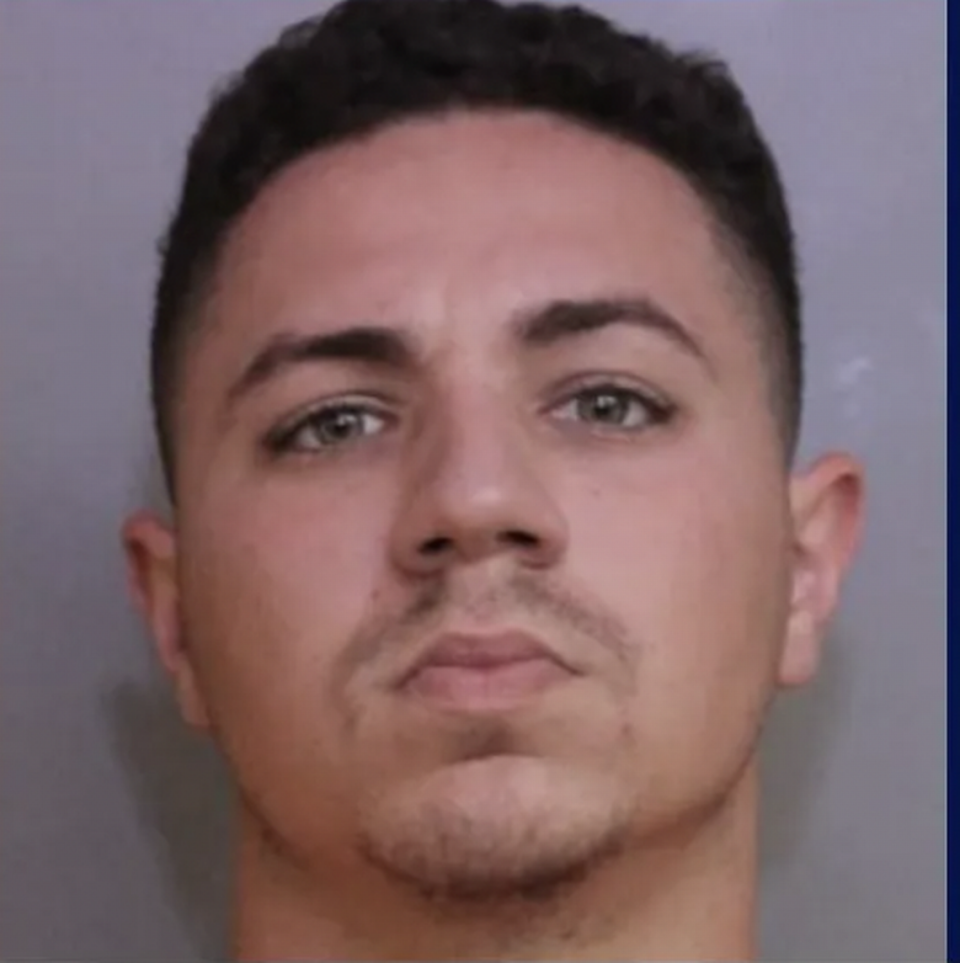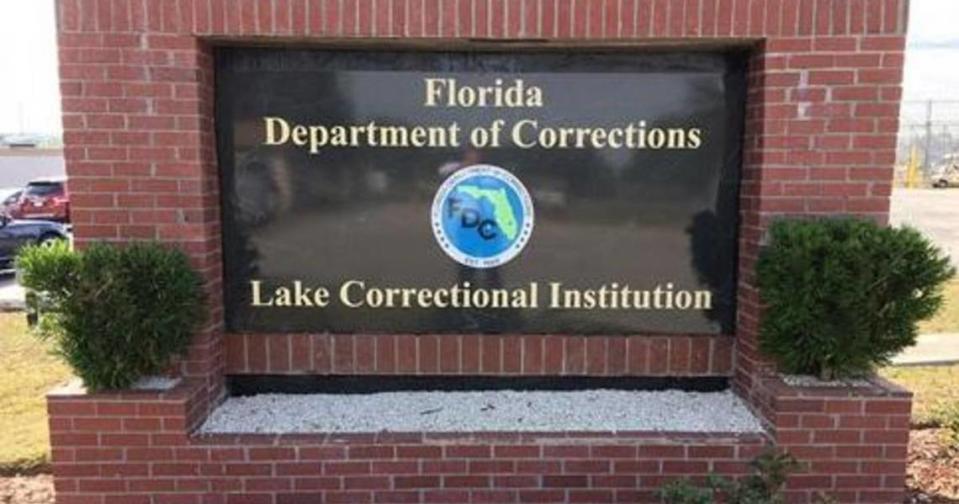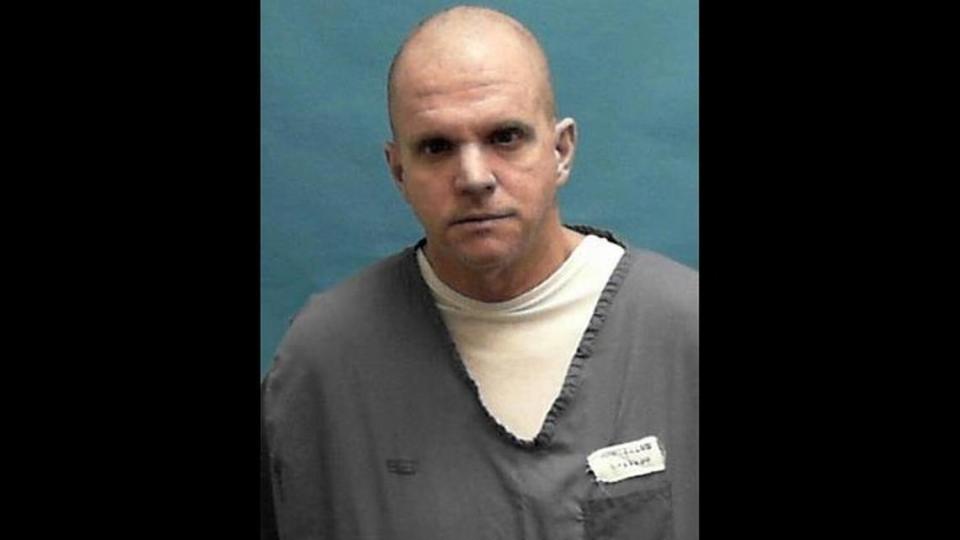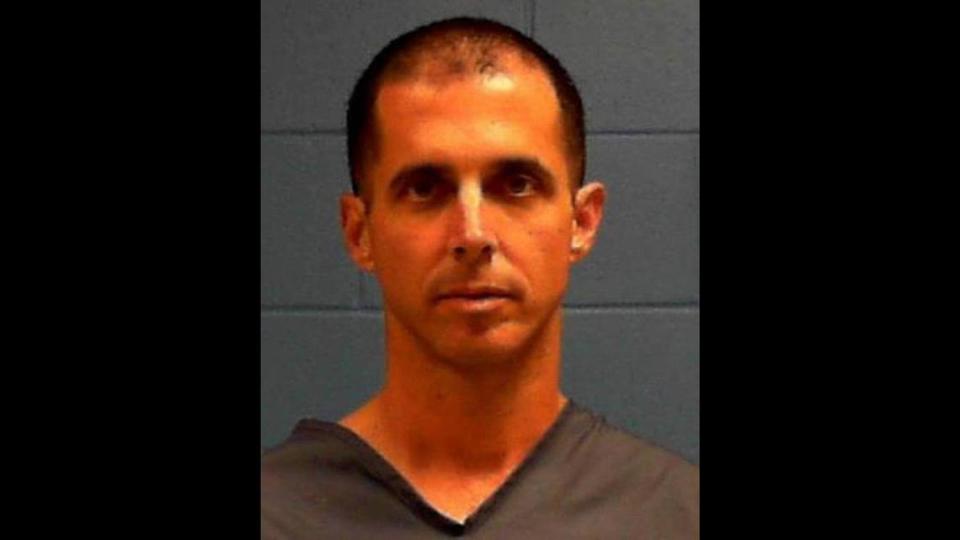‘It’s open season’: Florida guards were filmed beating pinned inmate. None will face trial
When a cluster of Florida prison guards took turns beating a prisoner at Lake Correctional Institution near Orlando, it was not unprecedented. Prisoners say beatings by Florida prison staff are common, though usually they occur in secret, outside the range of cameras.
What was unusual about this beating was that it was captured on video — not through surveillance cameras, but on a smuggled-in cellphone operated by an inmate, who provided narration. It was then posted on YouTube. Four staffers lost their jobs.
The Lake County State Attorney’s Office recently decided on the legal consequences for the men discharged for allegedly taking part in the caught-on-video beatdown and then lying about it: nothing.
Criminal charges filed in connection with the beating have been dropped.
In the footage from July 8, 2019, a group of officers is shown repeatedly striking the inmate. The unidentified inmate who recorded the beating can be heard saying, “This is why we are in fear of our life.” He went on to comment on the physical appearance of the inmate, Otis Miller, noting that his head appeared swollen. Miller suffered multiple injuries including broken ribs.
In dropping charges, a development first reported by ClickOrlando, the state attorney’s office said it was impossible to determine which blows caused the injuries sustained by Miller, 47. It also noted that Miller’s injuries could have occurred before the camera started shooting.
Less than a year later at the same prison, an inmate serving time for stealing four phone chargers died after being beaten by staff. Christopher Howell, 51, was handcuffed at the time, witnesses told the Miami Herald at the time. Corrections officer Michael Riley Jr. was charged with second-degree murder. As in Miller’s case, staffers were accused of tailoring their reports in an attempt to absolve officers. Howell’s name has been redacted from a publicly available list of FDC inmates who died while in custody that year. The criminal case is pending.

From materials made available to the Herald, a pat down triggered the beating of Miller, who was serving time for battery on a law officer and selling cocaine. He has been moved to another prison.
After the video surfaced, the Florida Department of Corrections released a statement condemning the actions of the officers and announced their immediate termination.

Criminal charges soon followed. Ian Gretka was charged with committing aggravated battery and malicious battery. His fellow officers, Hunter Lingo, Joshua Petersilge and Capt. Milton Gass, were charged with acting as principals to these alleged crimes. Under Florida criminal law, a principal is someone who has helped another person commit or attempt to commit a crime.
An affidavit shows that Gass was additionally charged with perjury for submitting a false use-of-force report to the Florida Department of Corrections. After the incident, the document stated, Gass met with the other involved officers, gathered information about their involvement, wrote their reports for them, and then “commanded, encouraged, or requested,” that they sign and submit the reports knowing that they included false information. Participants in a use-of-force are supposed to file their statements separately and without coaching.
The inaccuracies in these false use-of-force reports include a statement that Gass recovered a USB cellphone charger from Miller’s sock.
Omitted from the reports is the fact that Miller was struck in the face, causing bruising, swelling of the jaw, and a blood clot to the face. The affidavit pointed to a social media chat Gass had with other officers, where he said, “FYI inmate went to the hospital possible fractured jaw” as evidence that he was aware of Miller’s facial injuries.

Also included in the leaked group chat, first reported by the Florida Times Union, was a comment from Petersilge seemingly laughing about the beating saying, “Lmfao. All that over a piece of a charger.”
The video, which is still available on YouTube but with a warning about sensitive content, brought the false declarations and omissions in the reports to light, according to the affidavit.
Court records cite “insufficient evidence to prove one or more elements of the crimes charged” as the reasoning behind the dismissal of charges.
The lack of accountability despite video evidence is stunning, according to Ryan Andrews, the attorney who represented Miller in a civil rights lawsuit against the FDC that settled in the amount of $125,000. He was hopeful that this time would be different.
“What more could we possibly need to put people like this in jail?”
Andrews said this behavior is commonplace in the prison system, noting that minorities often face racism from corrections officers. To illustrate this point, Andrews referenced Miller’s deposition, in which he said that the officers hurled slurs and insults at him, regularly calling him “stupid.”
Andrews also expressed concern that officers may feel emboldened to behave similarly, believing that they will also be able to evade criminal consequences.
“It’s open season,” he said.
In a close-out memo, the Lake County State Attorney’s Office explained that the video evidence is not clear enough to determine where or when Miller suffered his broken ribs. Nor can the video determine who is striking which portions of Miller’s body when he sustained the rib injury, the statement further provided.
The statement highlighted the interviews of two other corrections officers whose accounts cast doubt on Gretka’s culpability. One officer, who was present during the incident, insisted that it was not Gretka but another officer who broke Miller’s ribs. Another officer watched the video and said it may be Gretka, but he couldn’t say for sure. Miller also identified another officer as the person responsible for breaking his ribs, according to the statement.
Absent a positive identification of the culprit causing Miller’s broken ribs, the state determined that it did not have enough evidence to prosecute Gretka for aggravated battery and malicious battery with proof beyond a reasonable doubt.
“There is direct exculpatory evidence negating the guilt of Defendant Ian Gretka that would be admissible during trial at this time. Additionally, there is insufficient evidence to continue prosecution of Defendants Milton Gass, Hunter Lingo, and Joshua Petersilge as principals to aggravated battery or malicious battery alleged to have been committed by Defendant Ian Gretka,” the statement read.
Although the discharged officers are no longer facing criminal trial, Paul Walker, press secretary for the Florida Department of Corrections, said that there is no change in their employment status.
Termination of these officers is not enough, according to Denise Rock, executive director of the prison rights advocacy group Florida Cares.
She said not only should they be ineligible for rehire, they should never be able to work in a position of authority over others.

Rock referenced the 2012 death of Darren Rainey, an inmate who was locked in a closet at Dade Correctional Institution retrofitted into a makeshift shower where, inmates said, they were punished by being subjected to scalding hot water. The temperature was controlled from a different room. Rainey, who suffered from mental illness and was serving time for selling cocaine, was locked in the shower for nearly two hours, pleading to be released, until he collapsed and died. The water stripped the skin from his corpse.
Neither the FDC administration nor prosecutors took any action, despite letters sent by an inmate, Harold Hempstead, describing what happened. After the Miami Herald exposed the episode two years later in a series of investigative reports, the department acted, replacing the warden.
One of the officers who placed Rainey in the shower had already left the department to work at a federal prison. The other resigned under fire and was hired almost immediately in a higher-paying position by the Miami Gardens Police Department. As an officer there, he was investigated by Internal Affairs on two separate occasions for allegedly having inappropriate relations with a woman while on duty.
News stories prompted the Miami-Dade State Attorney’s Office to conduct an investigation of Rainey’s death. It decided no charges were warranted. In a civil suit, Rainey’s family received a $4.5 million payout from the state.
For talking to journalists about what had happened, Hempstead had to be moved to a prison in another state for his own safety.

In the Miller case, Rock worries that the state attorney’s decision to not hold these officers responsible sends a message to corrections officers that they can act with impunity.
“The state attorney is choosing to have no accountability for state employees and they’re allowing lawlessness to exist in prisons,” she said, while also acknowledging that this will make it more difficult for officers who are behaving appropriately.
Elizabeth Buchanan, a West Palm Beach-based attorney specializing in criminal justice and prison administrative issues, noted that the video evidence of the attack makes this case unique.
“Most of the time these actions are not caught on camera like this, and, therefore, they don’t even get to the charging stage because prisoners are presumed to be lying when they make such allegations.”
Buchanan stressed that setting the proper tone on what is acceptable conduct while being employed within the department is critical during a time when prisons are grossly understaffed.
“This case and these charges being dropped is not helpful for letting future employees know how incarcerated Floridians should be treated.”

